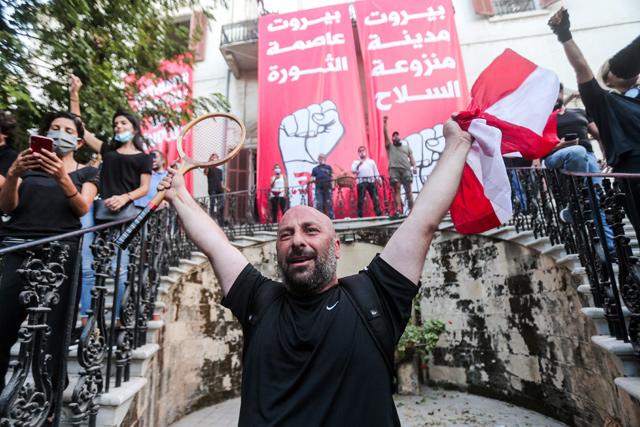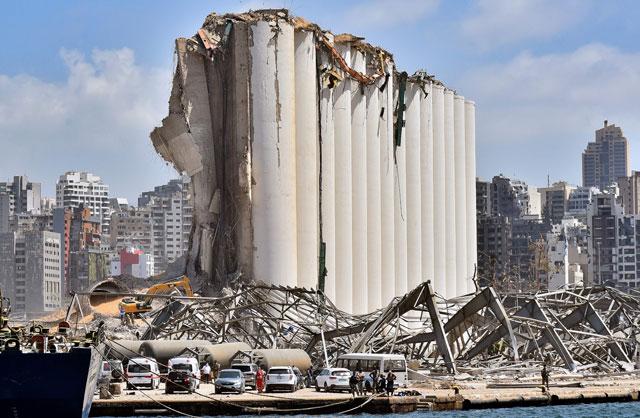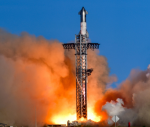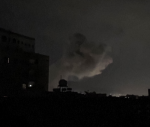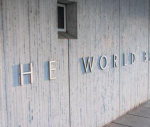You are here
Beirut reels from huge blast, deaths top 100
By AFP - Aug 05,2020 - Last updated at Aug 05,2020
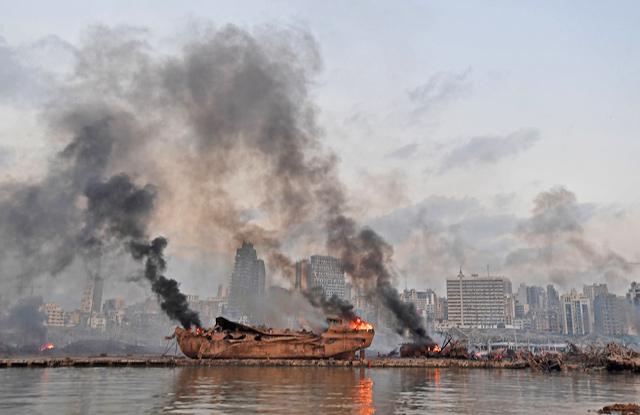
A ship in flames is photographed at the port of Beirut following a massive explosion that hit the heart of the Lebanese capital on Wednesday (AFP photo)
BEIRUT — Rescuers searched for survivors on Wednesday after a cataclysmic explosion at Beirut Port sowed devastation across entire city neighbourhoods, killing more than 100 people, wounding thousands and plunging Lebanon deeper into crisis.
The blast, which appeared to have been caused by a fire igniting 2,750 tonnes of ammonium nitrate left unsecured in a warehouse, was felt as far away as the island of Cyprus, some 240 kilometres away.
Beirut's Governor Marwan Abboud spoke of "an apocalyptic situation" he said may have made 300,000 people temporarily homeless and would cost the country over $3 billion.
The blast left the Lebanese capital resembling the scene of an earthquake, with thousands of people left destitute and thousands more cramming into overwhelmed hospitals for treatment.
"A massacre. I saw people screaming, covered in blood, homes broken, glass shattered, roads that look like Hiroshima or like a tsunami hit," Elie Zakaria, a resident of a neighbourhood close to the port, told AFP.
In an instant, the blast left destruction equivalent to that caused by the country's 1975-1990 civil war, levelling buildings several hundred metres away.
A resident of nearby Mar Mikhail, popular for its bars and cafes, said she saw bodies strewn in the street, apparently thrown off balconies and rooftops by the blast.
Many people had been watching and filming a fire caused by an earlier explosion when the second, massive blast went off.
‘The Apocalypse’
The resulting footage, widely shared on social media, shows a ball of fire and smoke rising above Beirut and a white shockwave engulfing everything around it.
The mushroom-shaped explosion — which seismologists said was logged as the equivalent of a 3.3 magnitude quake — and the scope of the damage drew nuclear analogies in many people’s accounts of the tragedy.
“The Apocalypse” read the headline of L’Orient-Le Jour, the main French-language daily in Lebanon, a country that has seen its share of explosions in its recent past but nothing on this scale.
The already embattled government of Prime Minister Hassan Diab described the circumstances at the port that led to the explosion as “unacceptable” and vowed “those responsible for this catastrophe will pay the price”.
Messages of support poured in from around the world, including France, which said it would send three planes carrying rescuers, medical equipment and a mobile clinic, followed by a visit Thursday by President Emmanuel Macron.
The disaster was another blow for an economy already on its knees after Lebanon’s first ever sovereign debt default earlier this year and a crippling devaluation that has plunged half the population into poverty.
The obliteration of its main port signalled more hardship ahead, in a country heavily reliant on imports.
The UN’s Food and Agriculture Organisation warned on Wednesday that the destruction of grain silos would cause critical severe flour shortages.
Criticism of the government was already rife on social media, where Lebanese users argued that a disaster of such magnitude could only strike in a state whose institutions are crippled by incompetence and corruption.
Late Tuesday, thousands of families drove out of Beirut to take their families to safety, but many others were left stranded without a roof, unable to go anywhere or unwilling to leave their gutted homes open to looters.
The overnight rescue effort was slowed by lack of electricity, already intermittent at best.
Security forces sealed off a huge area around the blast site, searching for bodies and survivors under the rubble of levelled buildings while rescue boats scoured the waters off the coast.
‘Dark days’
Hospitals already stretched to the brink by a spike in coronavirus cases in recent days were pushed to new limits by the influx of wounded and were forced to turn many away.
Saint-Georges hospital was badly damaged by the explosion and lost several members of its staff.
“We’ve had some dark days in Lebanon over the years but this is something else,” said Rami Rifai, a 38-year-old engineer.
He spoke to AFP from a hospital where his two daughters were receiving treatment after sustaining cuts despite being half-a-kilometre from the seat of the blast.
“We already had the economic crisis, a government of thieves and coronavirus. I didn’t think it could get worse but now I don’t know if this country can get up again,” he said.
“Everyone is going to try to leave. I will try to leave,” he added, his voice choked by tears.
The Red Cross said on Wednesday morning that more than 100 deaths had been confirmed. It also reported around 4,000 injured, prompting fears that the death toll could rise significantly.
In a country where smallholders have been unable to withdraw even limited amounts of cash from banks since the start of the year, there was little hope of compensation for those whose property was destroyed.
Crippled by debt and political paralysis, Lebanon, which was due to celebrate its centenary next month, looked ill-equipped to tackle the new crisis.
But one glimmer of hope could be seen in the grassroots solidarity displayed as people launched initiatives on social media to help people locate missing loved ones or offer free accommodation to those made homeless.
Related Articles
BEIRUT — Lebanese protesters stormed the foreign ministry in Beirut on Saturday as anger exploded over a deadly blast that made hundreds of
BEIRUT — A fuel tank blast in Lebanon early on Sunday killed 28 people and injured nearly 80, authorities and medics said, burning a crowd c
BEIRUT — Several thousand protesters gathered in central Beirut on Saturday to vent their anger at a political elite they blame for a deadly


